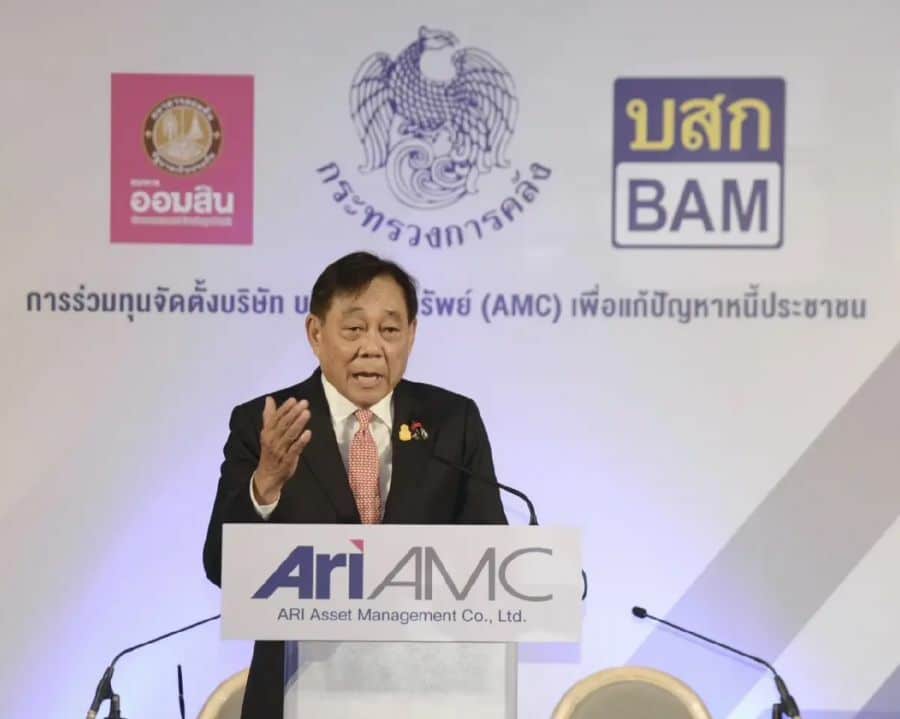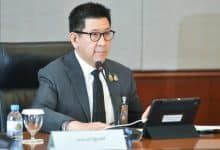Minister proposes shorter blacklist period for bad debtors

Finance Minister Pichai Chunhavajira proposed reducing the time period for which bad debtors remain on the National Credit Bureau’s blacklist, aiming to facilitate quicker access to new borrowing opportunities.
While speaking at a signing ceremony for the establishment of ARI-AMC, a joint venture between the Government Savings Bank (GSB) and Bangkok Commercial Asset Management Plc (BAM), Pichai noted that the current five-year duration on the National Credit Bureau (NCB) blacklist, followed by an additional three years of record-keeping, is excessively long.
He indicated plans to review legal provisions to potentially shorten this period to two years plus three years of record-keeping, or even one year plus three years.
This follows Pichai’s announcement earlier this month, where the Finance Ministry is said to be preparing a budget of 10 billion baht to clear the debts of small-scale debtors, thereby removing them from the blacklist.
He references how more than 1 million retail debtors at state-owned specialised financial institutions, with an average debt per person of 10,000 baht, have defaulted and become non-performing loans (NPLs), listed by the NCB.
Pichai added that the government plans to use the 10 billion baht budget to clear these debts, enabling debtors to repay the state gradually within two to three years.
Socially responsible approach
The ARI-AMC joint venture equally held by GSB and BAM, starts with an initial registered capital of 1 billion baht. The venture aims to use a socially responsible approach while still targeting appropriate returns
Pichai explained that bad debts from state financial institutions transferred to ARI-AMC will be managed under more lenient debt restructuring conditions, assisting debtors in avoiding the NPL classification.
Initially, 45 billion baht worth of bad debts from GSB will be transferred to ARI-AMC for management, with an expected 70-80% of these debts to be successfully managed.
Pichai further highlighted both internal and external factors affecting the debt burden of individuals and small and medium-sized enterprises, including the adverse effects of the pandemic and rising interest costs which impacted debtors’ liquidity and ability to meet repayments.
Regarding the government’s debt relief scheme for NPLs of self-employed individuals, the government anticipates that by the end of the year, around 700,000 to 800,000 debtors will return to the status of performing loans.
President of GSB, Vitai Ratanakorn stated that the new joint venture will enable NPL debtors to be removed from the NCB’s blacklist more quickly. He noted that ARI-AMC can offer debt cuts or interest rate reductions more effectively than if the debt remained with the financial institution.
Accounts transferred
He noted that GSB will transfer to ARI-AMC 500,000 bad debtor accounts with a principal debt value of 45 billion baht. The sales price will be re-evaluated to align with market prices.
By the end of July, the first batch of bad debts, comprising 140,000 accounts with a debt value of 10 billion baht, is scheduled for transfer to ARI-AMC. These debtors have outstanding debts not exceeding 20 million baht each.
Next year, ARI-AMC will start purchasing additional bad debts from state financial institutions.
The joint venture is expected to operate for no more than 15 years.
Registered capital could be increased if necessary, with GSB providing ARI-AMC with low-interest loans to manage additional bad debt acquisitions.
Chief executive of BAM, Bundit Anantamongkol said the partnership would create synergy between the two organisations.
BAM has 25 years of experience in debt management, having resolved 155,000 cases of bad debt worth more than 480 billion baht while selling 52,000 non-performing assets valued at 122 billion baht.
GSB’s extensive network of more than 1,000 branches will serve as contact points or service centres for customers, reported Bangkok Post.
Latest Thailand News
Follow The Thaiger on Google News:


























